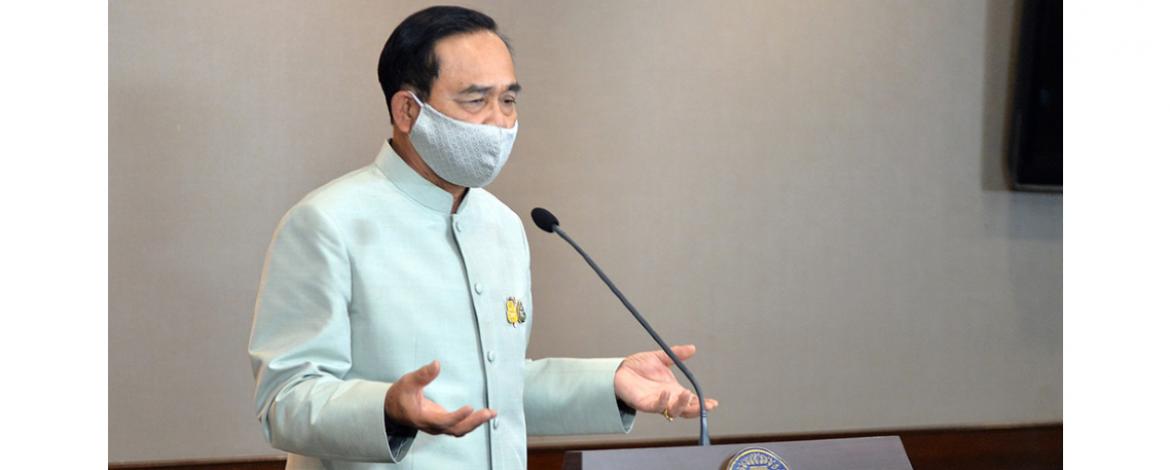In a new briefing paper issued today, the ICJ calls on the Thai authorities to cease all arbitrary restrictions on the right to freedom of expression as a result of the enforcement of new regulations and existing laws purportedly in response to the COVID-19 pandemic.
The Thai authorities have resorted to new regulations and existing laws featuring provisions that are inconsistent with Thailand’s international human rights law obligations to unduly restrict the right to freedom of expression during the pandemic.
These provisions contain vague and overbroad language, and prescribe severe penalties for failure to comply, in contravention of the principles of legality, necessity and proportionality.
These regulations and laws include, among others, the Emergency Decree; Regulation No. 1 and 27 Pursuant to the Emergency Decree; the Computer-related Crimes Act B.E. 2560 (2017); and lèse-majesté and criminal defamation provisions under the Criminal Code.
Under an overly expansive purported justification of protecting “public health”, the Thai authorities have enforced these laws and imposed criminal sanctions against individuals they accused of “spreading false information”, and to prosecute people solely for expressing critical views of the Government’s COVID-19 response.
The authorities’ broad-brush approach not only contravenes Thailand’s obligation under international human rights law to respect and protect the right to freedom of expression and information, but it also undermines the right to health, as this right, in turn, entails an obligation on the part of States to ensure access to health-related information and entitles all people to seek, receive and share information and ideas concerning health issues.
In light of its concerns, the ICJ calls on the Thai authorities to:
- Ensure open communication to promote access to current and accurate health information in the context of COVID-19;
- Cease harassment and persecution, including through the use of the criminal law, of all individuals solely for exercising their rights to free expression and information;
- Drop all charges against any individual facing prosecution for alleged violation of the above-mentioned laws since they are contrary to Thailand’s human rights obligations. In addition, issue non-prosecution orders, and refrain from bringing further criminal charges under the same laws;
- Repeal or substantially amend criminal law provisions — including the Emergency Decree, articles 112, 326, 327 and 328 of the Criminal Code; and section 14 of the CCA — that serve to criminalize or unduly restrict the rights to freedom of expression and information and other rights;
- Ensure and facilitate equal access to adequate, effective and prompt remedies and reparation for all individuals whose human rights have been violated by State, particularly the right to freedom of expression and information in the context of COVID-19 restrictions.
Panel Discussion
The paper will form the basis for an online panel discussion titled “Speaking Truth to Power: Curtailing Free Expression and Information in the Midst of the COVID-19 Pandemic in Thailand”. This discussion will take place in the context of a webinar jointly convened by the ICJ, Amnesty International Thailand, ARTICLE 19 and Thammasat University’s Faculty of Law on 23 July 2021.
Legal Brief in English and Thai.
The recording of the webinar is available here.
Background
On 25 March 2020, using powers under the Emergency Decree on Public Administration in Emergency Situation B.E. 2548, the Thai government declared an “emergency situation” in all areas of Thailand, purportedly to combat the COVID-19 outbreak. Since then, and as part of their purported response to the pandemic, the Thai authorities have enacted new regulations under the Emergency Decree, some of which are not compliant with Thailand’s international human rights law obligations to respect and ensure the rights to freedom of expression and information.
The flaws in these new regulations, in addition to other existing laws that are also non-human rights compliant, have allowed the Thai authorities to systematically and unduly restrict the exercise of the rights to freedom of expression and information. These restrictions have been invoked as necessary under overly expansive purported “public health” justifications, such as curbing the spread of “false information”, as well as “security”, “public order” and “good morals”. Moreover, these restrictions can lead to the imposition of disproportionately severe criminal punishments.
The ICJ has previously reviewed, assessed and made recommendations in relation to the implementation of the laws curtailing the Freedom of Expression in two reports and briefings:
- Dictating the Internet: Curtailing Free Expression and Information Online in Thailand, released in June 2021; and
- The Implementation of Thailand’s Emergency Decree in Response to the COVID-19 Pandemic in Thailand, released in July 2021





